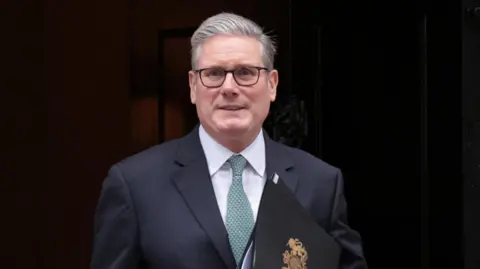Recognising Palestinian state helped get ceasefire, says Starmer

Brian WheelerPolitical reporter
 Reuters
ReutersThe UK’s decision to recognise Palestinian statehood helped to bring about the ceasefire deal in Gaza, Sir Keir Starmer has told MPs.
Speaking after a summit in Egypt, the PM stressed that the agreement signed there belonged to US President Donald Trump, telling MPs: “This is his deal.”
But he said the UK had been in a position to work “behind the scenes” for a ceasefire “precisely because of the approach this government takes,” including its recognition of a Palestinian state.
Conservative leader Kemi Badenoch said recognising Palestine without setting a condition for the release of hostages was “rewarding terrorism” and accused the PM of “diminishing” UK influence in the Middle East.
Sir Keir told MPs that Monday’s deal provided “a moment of profound relief” as he paid tribute to both the hostages and the civilians killed in Gaza.
But he also stressed that “making that peace last will be no less difficult a task” and that implementing the peace plan “is no small challenge”.
Negotiations will now follow on phase two of the deal, which involves Hamas laying down its weapons – a possibility the group is reported to have dismissed – and the rebuilding of Gaza under a “peace board” chaired by Trump and potentially including former prime minister Sir Tony Blair.
Sir Keir said the UK stood ready to deploy its diplomacy and expertise to support the reconstruction of Gaza – the devastation of which he says “defies description”.
The UK will provide an additional £20m in humanitarian aid to provide “water, sanitation and hygiene products” to people in the territory, he added.
There are no plans to send British troops to be part of the multinational force that will monitor the truce, but the prime minister said the UK would help with the ceasefire monitoring process.
And he said the UK could draw on its experience in Northern Ireland to “play a full role” in the decommissioning of Hamas’s weapons and capability.
The prime minster told MPs the deal represented the “first real chance we’ve had” of a two-state solution since the 1993 Oslo Accords, which were meant to provide interim self-government for Palestine as a stepping stone to an independent state.
“So we are fully committed to this [deal] because a safe and secure Israel, alongside a viable Palestinian state, is the only way to secure lasting peace for the Middle East,” he told MPs.
The PM also claimed that the UK’s decision to recognise Palestinian statehood had aided the cause of peace.
He told MPs: “This move, taken alongside our allies France, Canada, Australia and others, helped lead to the historic New York declaration, where for the first time the entire Arab League condemned the atrocities of October 7, urged Hamas to disarm and, crucially, demanded that they end their rule in Gaza.”
Kemi Badenoch accused the prime minister of “taking the wrong decisions time and time again, diminishing our influence in” the Middle East.
“It’s quite clear that UK relations with Israel have been strained by the actions of this government,” she told MPs, to cries of “shame” from the Labour benches.
The Conservative leader added: “In a move praised by Hamas, Labour decided to recognise a state of Palestine with no condition to release the hostages still held in the tunnels of Gaza, rewarding terrorism.”
At the time, the US voiced strong opposition to the UK and other countries recognising Palestinian statehood, with Secretary of State Marco Rubio saying Hamas would “feel more emboldened” by the move.
Under Trump’s proposed 20-point peace plan, Gaza would initially be governed by a temporary transitional committee of Palestinian technocrats – supervised by a “Board of Peace”.
Governance of the Strip would eventually be handed over to the Palestinian Authority – which administers the West Bank – once it has undergone reforms.
According to the plan, Hamas – which seized control of Gaza in 2007 by ousting its rivals, a year after winning legislative elections – would play no future role in its governance, directly or indirectly.
The ceasefire deal says Hamas should release all the 48 Israeli and foreign hostages still in Gaza after two years of war.
All but one were among the 251 people abducted during the Palestinian group’s attack on southern Israel on 7 October 2023, during which about 1,200 other people were killed.
Israel responded by launching a military campaign in Gaza, during which more than 67,800 people have been killed, according to the territory’s Hamas-run health ministry.



